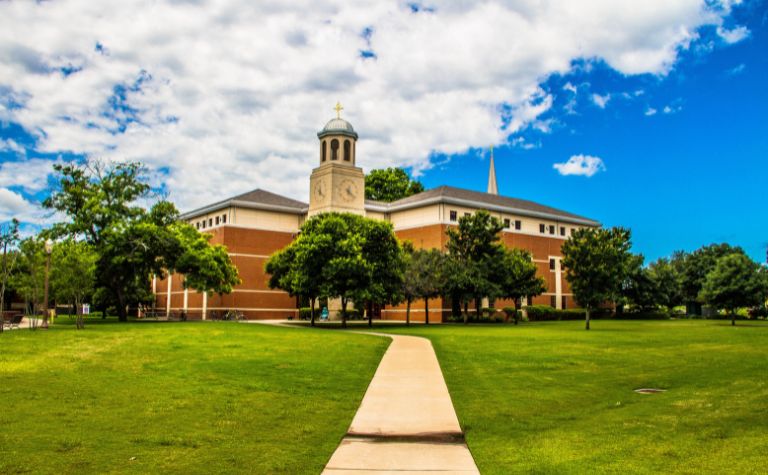Seminaries have long served as the bedrock of theological education and spiritual leadership formation.
At their core, seminaries are specialized institutions that offer rigorous academic and spiritual training for individuals called to Christian ministry.
Historically, these institutions emerged as centers where biblical texts and doctrines were deeply studied, dissected, and debated.
Over time, their role has expanded beyond just academic exploration, playing a vital role in the personal and communal spiritual journey of countless Christians.

Deepening Theological Understanding
The pursuit of theological understanding is a journey that often begins with personal faith, curiosity, or a sense of calling.
However, it’s at seminary where this understanding is deepened, broadened, and fine-tuned.
Seminaries offer a structured environment uniquely designed to delve into biblical texts and doctrines with a depth that is hard to achieve elsewhere.
At its essence, seminary education goes beyond merely reading scriptures or theological works.
Courses at seminaries often encompass a broad spectrum of theological topics, from scriptural interpretations to historical contexts, from doctrinal debates to ethical implications.
Such extensive study equips students with the tools to grapple with complex theological questions, fostering a richer and more nuanced understanding of their faith.
In essence, deepening theological understanding at a seminary is not just an academic endeavor but a transformative experience, building a solid foundation for a lifelong journey of faith and service.

Forming Spiritual Leaders
Central to the mission of seminaries is the formation of Christian leaders equipped to guide, inspire, and serve their communities.
Leadership in a ministry context requires a unique blend of skills and attributes, many of which are nurtured and honed within the walls of a seminary.
First and foremost, spiritual leadership is about embodying the values, teachings, and principles of one’s faith.
While theological understanding is crucial, leadership also demands a lived experience of these teachings.
Seminaries provide a conducive environment where students can practice and internalize these principles, ensuring that they know their faith and live it.
Furthermore, seminaries focus on cultivating essential pastoral skills.
These skills range from counseling and listening to public speaking and community organizing.
Through various programs, practical training, and mentorship opportunities, students learn how to effectively minister to the needs of their congregations, handle crises, and provide spiritual guidance.
Another vital aspect of forming spiritual leaders is the development of personal character and resilience.
The role of a Christian leader often comes with its set of challenges, from navigating community dynamics to addressing moral dilemmas.
Seminaries recognize this and, as such, emphasize character development, ethical decision-making, and personal reflection.
Lastly, the collaborative environment of seminaries plays a pivotal role in leadership formation.
By engaging with peers, mentors, and community members, students learn the importance of teamwork, understanding different viewpoints, and building bridges between various groups.
In summary, while the journey to spiritual leadership is deeply personal, seminaries play a crucial role in shaping and guiding this journey.
They ensure that emerging leaders are knowledgeable, compassionate, resilient, and adaptive, ready to serve their communities with integrity and purpose.

Engaging with Contemporary Issues
In a rapidly evolving world, Christian leaders are often looked upon to provide guidance and clarity on contemporary issues, whether they be social, political, or ethical.
As such, seminaries are responsible for preparing their students to engage with the challenges of the modern age through the lens of faith.
One of the fundamental ways seminaries address contemporary issues is by integrating them into the curriculum.
This allows students to examine topics like social justice, environmental stewardship, technological advancements, or global politics from a theological perspective.
By doing so, students are equipped with the tools to form well-informed opinions and to contribute meaningfully to societal debates.
Workshops, guest lectures, and discussions further provide students with opportunities to hear from experts in various fields, understand different viewpoints, and reflect on the implications of current events on their faith and practice.
This dynamic approach ensures that students are not in a theological bubble but are actively interacting with the world around them.
Practical fieldwork, where students engage with communities, participate in outreach programs, or work on projects addressing local challenges, further grounds their education in real-world scenarios.
This hands-on experience enables them to see the tangible impact of faith-based initiatives and their role in effecting positive change.
In conclusion, while seminaries are rooted in age-old traditions and teachings, they are by no means disconnected from the present.
Instead, they serve as crucial platforms where the timeless wisdom of faith meets the pressing questions of today, preparing students to be adaptable and responsive spiritual leaders in our ever-changing world.
Serving as a Bridge Between Scholarship and Faith
At the intersection of academic inquiry and heartfelt belief lies the unique role of seminaries.
These institutions serve as bridges, connecting the rigorous intellectual exploration of theology with the deeply personal experience of faith.
This confluence is crucial, ensuring that Christian leaders are grounded in both scholarship and spiritual conviction.
One of the primary ways seminaries foster this balance is by emphasizing academic excellence.
Seminary students are encouraged to approach biblical texts and doctrines with the same rigor and scrutiny as any scholarly work.
This means analyzing, questioning, and debating, all within a framework that respects and upholds the sanctity of these teachings.
The result is a deep and nuanced understanding that is both intellectually robust and spiritually resonant.
Yet, seminaries also understand that knowledge alone does not make a spiritual leader.
Thus, equal emphasis is placed on personal reflection, prayer, and spiritual practices.
These activities ensure that students not only comprehend their faith on an intellectual level but also experience it in their hearts and lives.
It’s this combination of head and heart that forms the foundation of authentic Christian leadership.
Moreover, the bridge between scholarship and faith is further strengthened by the diverse community within seminaries.
Scholars, theologians, and believers from various traditions come together, sharing their insights and experiences.
This collaborative atmosphere enriches the learning experience, allowing students to see the beautiful tapestry of faith that is woven from different threads of understanding and belief.
In sum, seminaries play a pivotal role in ensuring that faith is not just felt but also understood, and that scholarship does not remain in the realm of the abstract but is deeply connected to the lived experience of believers.
By serving as this bridge, seminaries ensure that Christian leaders are well-rounded, deeply informed, and genuinely connected to the faiths they represent and serve.
Recent Posts
David Jeremiah, a renowned pastor, author, and speaker, has captivated the hearts of many with his compelling sermons. His messages resonate deeply with diverse audiences, leaving an enduring...
Tim Keller, a distinguished pastor, theologian, and author, has garnered a devoted following through the profound impact of his sermons. In this article, we will explore seven compelling reasons...
